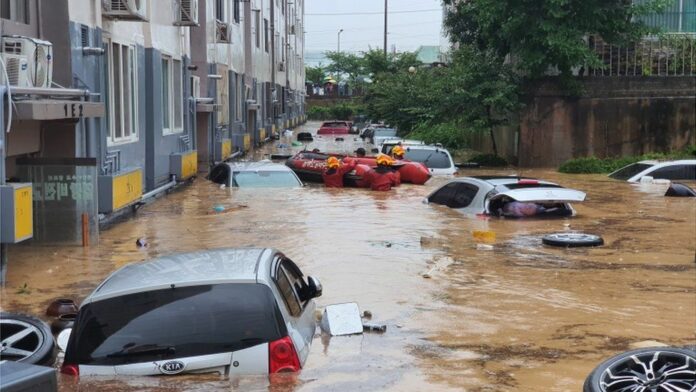South Korean flood-induced fatalities have seen a stark increase, reaching a toll of 40, following the recovery of 13 bodies from a submerged tunnel. The Miho River, located in the vicinity of Cheongju, around 70 miles south of Seoul, saw an abrupt overflow on Saturday.
The consequent inundation trapped a number of vehicles, including a bus, within an underpass in Osong, causing a tragic loss of lives. The Ministry of Public Administration and Safety, in its Monday statement, confirmed that nine individuals were rescued from the scene.
South Korean Flood: Persisting Rainfall Complicates Situation
Rescue and recovery operations remain underway despite the ongoing heavy rainfall in the area. From Thursday onwards, South Korea has been subjected to relentless precipitation, with up to 23 inches of rainfall reported. The extreme weather has induced landslides, led to road collapses, devastated crops, and caused considerable damage to homes and other structures.
Nine people remain unaccounted for, one in the southern port city of Busan and eight in the southeastern North Gyeongsang province, according to the ministry.
Forecasts Predict Continued Heavy Rainfall
As the South Korean flood continues to wreak havoc, weather forecasts predict no immediate respite. The Korea Meteorological Administration, in its latest news release, has projected heavy rain for the country’s southern region on Monday, with potential hourly rainfall rates reaching 2.5 inches on Tuesday. Furthermore, the agency issued a warning for Jeju Island, off the south coast, where rainfall could intensify to 3.1 inches per hour on Wednesday.
President Yoon Suk Yeol Calls for Better Preparedness
South Korean President Yoon Suk Yeol, having returned from his European tour, addressed the flood situation during a news conference. Acknowledging the increasing prevalence of unusual weather events, he emphasized the need for adaptability. “We need to completely dismantle thinking that these extremes are an aberration,” he stated.



